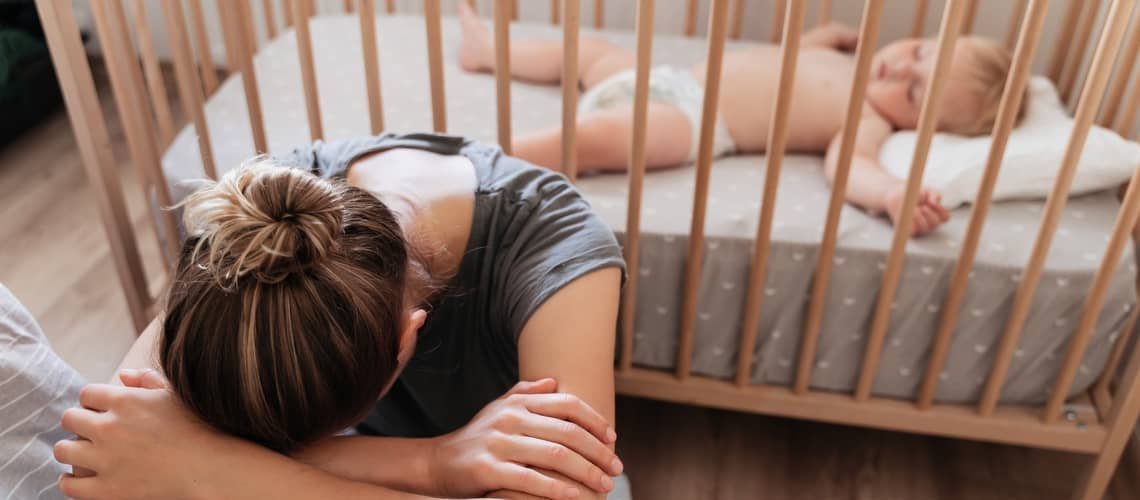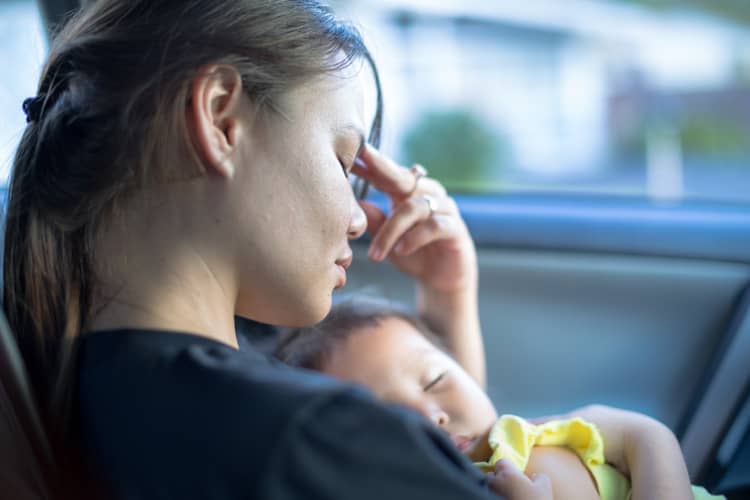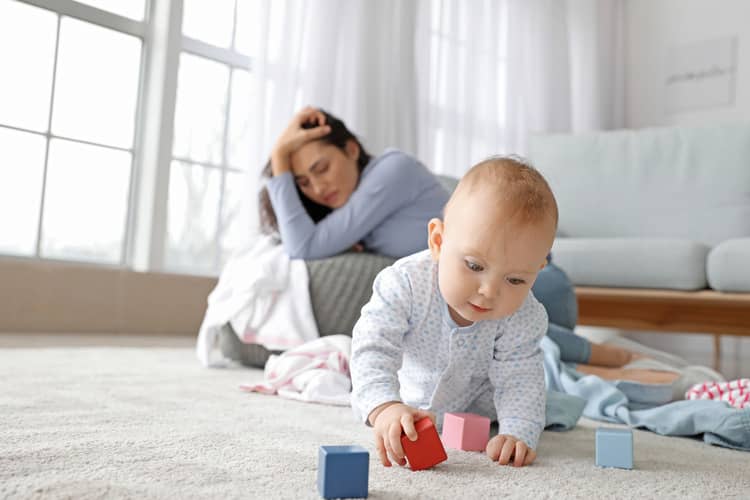
Postpartum depression - signs, manifestations, stories. We know how long it takes
Pregnancy and motherhood. The most beautiful, but also the most complicated consecutive periods in a woman's life, which require not only a lot of physical strength, but also mental strength. However, the mental side is often forgotten, as a result of which many mothers may experience the so-called postpartum depression. Those around the distressed mother often attribute the symptoms to hypersensitivity caused by hormonal changes, lack of sleep, and the huge rush of responsibilities after the birth of the baby. However, it is necessary to realize that this does not necessarily apply in every case, and the problem can be much bigger than it seems at first glance.
- What is postpartum depression?
- Postpartum depression and its signs
- Why does postpartum depression occur?
- How long does postpartum depression last?
- Seeking help for postpartum depression
- Postpartum depression and its treatment
- Postpartum depression or postpartum psychosis
- Postpartum depression in men
- Postpartum depression - experiences
- The most frequent questions - FAQ
- Comments
In the following paragraphs of our article, we will summarize what postpartum depression consists of, how long it lasts, what symptoms a woman experiences in this psychological state, and what treatment approach is recommended by doctors in the case of postpartum depression. However, we also bring some interesting facts regarding the manifestations of postpartum depression in men and the differences between depression and postpartum psychosis.
What is postpartum depression?
Postpartum depression is one of those topics that needs a lot of attention. In the past, trivializing important topics related to mental well-being and mental health was considered a kind of national sport, while nowadays we can already talk about a certain progress forward, and therefore towards a wider awareness in the matter of mental health. Postpartum depression itself also falls within the scope of these topics.
Postpartum depression is a depressed state of mind that a person can get into even a year after giving birth. We can talk about a very common phenomenon, which is encountered by more than one in ten mothers on average. However, each case is unique, which means that it is not possible to clearly determine the potential extent of the impact on the life of a particular mother. Differences between individual cases can be observed in the severity and course of the disease. While some mothers may show signs of sadness, others experience so-called paralyzing depression, which greatly affects the daily performance of the mother and her attention to the baby.
It is very important to recognize the symptoms of postpartum depression in time, because failure to address such a psychological imbalance can lead to a substantial escalation of the mother's mental state, which often results in a fatal threat not only to her own life, but also to the life of the baby itself.

Postpartum depression and its signs
As in the case of other diseases, whether physiological or psychological, postpartum depression does not just appear out of nowhere. It is accompanied by certain symptoms, on the basis of which this diagnosis can be established. The physical and psychological symptoms of this disease are very closely related to each other, which does not mean that every woman with postpartum depression must show all of them.
Emotional and psychological manifestations of postpartum depression
The word "depression" itself is generally associated with sadness and low mood, which is not excluded even in connection with postpartum depression. Such states of psychological discomfort and depression can occur immediately after childbirth, but this symptom can manifest itself at a later stage, and therefore several months, sometimes even a year after childbirth. You have to pay attention to the so-called the baby blues period and its distinction from postpartum depression.
Baby blues occurs in almost every mother right after giving birth and lasts for a maximum of two weeks. This condition is completely common and normal, since the arrival of a baby brings about great changes in the life of the mother and the whole family, while the birth itself costs the mother a lot of effort in the mental, emotional and physical plane. Baby blues and postpartum depression are significantly differentiated by the duration of the mother's psychological state. While the baby blues go away with the stabilization of hormones within two weeks after birth, postpartum depression sticks with the mother for several months, while in many cases it worsens due to neglect and failure to solve the problem.
Low mood and sadness go hand in hand with the inability to find the pleasurable aspects of life. Postpartum depression is a very complex problem in this respect, because the sight of their own child does not bring joy to mothers, which is a very overwhelming fact for many mothers, which drives their mental state to a more substantial deterioration. To make matters worse, other signs of this mental illness are also being collected, especially in the form of difficulties in taking care of oneself or the child itself.
This aspect is caused by a disorder in the sphere of cognitive functions, such as decision-making, memory and concentration, which also originates in postpartum depression and leads to other negative emotional manifestations in the form of feelings of inability to cope with parental responsibilities and feelings of guilt. The ability to connect intimately, or emotional attachment to the baby.
Due to postpartum depression, mothers are convinced that they are bad parents, which causes fear of being alone with their own baby. Irrational thoughts and ideas about the ability to harm one's own offspring are often part of this symptom. The most common symptom, which often leads to trivialization of the problem by the mother herself, but also by her surroundings, is crying. Many times, people think that these are normal hormonal fluctuations, and therefore ignore the other accompanying symptoms of postpartum depression, which can lead to their gradual escalation.

Physiological symptoms of postpartum depression
One of the symptoms of postpartum depression is a lack of energy, which is caused by psychological discomfort and a number of pessimistic and negative thoughts induced precisely as a result of depression. Exhaustion subsequently leads to sleepiness, which, however, in addition to newborns and their sleep regime, is not a need that is sufficiently satisfied in mothers in the first months after childbirth. In some cases, the exact opposite can also occur, i.e. insomnia, or insomnia, which again causes exhaustion, depression and bad mood.
In essence, it can be concluded that all the above-mentioned symptoms of postpartum depression are interwoven into one vicious circle, from which one can only get out with external, but especially professional, help. Many mothers are not willing and able to use it due to their closedness to the outside world and lack of interest in their surroundings.
Long-term exposure to depression can lead to extreme changes in food intake. While in some mothers there is a complete loss of appetite, in others, on the contrary, this basic need increases rapidly. In both cases, it is an unhealthy lifestyle that affects not only the mother, but also the baby. The physical manifestations of postpartum depression include sweating, accelerated pulse, shortness of breath, rapid heartbeat, tremors, chest pressure, and other symptoms associated with stress and fear.
In the postpartum period, many new mothers face difficulties in accepting the visible changes that their body has gone through due to pregnancy and childbirth, which can lead to a refusal to have sex with a partner. In this case, the sexual appetite remains intact, while the problem is rather in the woman's head, specifically with her perception of her sex drive as insufficient. However, in women suffering from postpartum depression, sexual appetite is reduced to a borderline minimum, which again opens up space for other pessimistic thoughts.

Why does postpartum depression occur?
The exact cause of the occurrence of this mental illness with its impact on the mother's emotional and physical well-being is still unknown, but it is proven that mothers who have experienced depressive episodes in the past or who have a family history of postpartum depression most often suffer from this mental illness. Changes related to the arrival of a child also have a significant impact on the emergence and development of this disease. Childbirth itself is a sign of an unimaginable burden on the mother's body, while significant hormonal changes occur after childbirth, which significantly affect the mother's psychological balance.
The pressure that comes with the birth of a child has a big impact on the development of postpartum depression. Especially for first-time parents, there are huge changes in lifestyle and daily habits, while the pressure of new responsibilities is supplemented by many times unnecessary and harmful pressure from the environment, which always seems to know better what the child needs than the parents themselves. The emotional well-being of both parents is also affected by sleep deficit, lack of individual space and huge responsibility for another person. It is true that most parents are happy about the baby, but that does not mean that their lives have not been turned upside down by the arrival of their dream baby.
These days, social networks are literally overflowing with photos of ideal families, in which parents fulfill all their responsibilities, have a few hobbies and still look perfect, which have a negative effect on the psychological well-being of parents, but more often mothers. This false social pressure can cause great problems for parents in terms of feelings of inadequacy and guilt that their lives are nowhere near what they see in other people's lives online.
From the point of view of socialization, there are problems in maintaining relations with friends, especially with those who do not yet have children and families. Understanding on their part towards the parental situation is rarely found, which leads to the deterioration of relationships and even complete separation from individual people. Especially for mothers, the lack of contact with reality, and thus with their closest friends, not counting mothers on sandpits and playgrounds, leads to closing off from the surrounding world and a complete separation from their circle of friends, who could potentially pull her out of the stereotypical carousel of constant changing diapers, feeding and putting the baby to sleep.

How long does postpartum depression last?
Postpartum depression is a very individual illness, the length and course of which varies depending on various sociological and psychological factors. For some women, postpartum depression can "disappear" within three to six months, recovering completely on their own.
For every fourth mother, postpartum depression has a serious course, from which she cannot recover without external help. That is why it is necessary for the mother to admit the problem as soon as possible, or so that the deterioration of the mother's mental state is noticed by those around her, so that professional intervention can take place as quickly as possible. The earlier intervention is made, the less likely it is that postpartum depression will turn into crippling depression.
Seeking help for postpartum depression
The moment you notice that someone around you is suffering from postpartum depression, or you start to notice such changes in your own psyche, you need to seek professional help. Many times a person thinks that he can deal with such a mental difficulty on his own, but it is never that simple. Postpartum depression is a very serious mental illness that greatly affects the development of the child itself, which means that it requires a particularly thorough and serious approach.
It is true that the longer you delay consultation with a specialist, the higher the probability of complications in the course of untreated depression itself. The state in which the mother finds herself during postpartum depression is considered irrational, while exactly such actions are characteristic of this mental illness. As we mentioned above, cognitive functions such as memory and decision-making do not work as they should, leading the mother to engage in questionable behavior that many times she does not even remember.
In an effort to prevent terrible consequences in the form of unwanted harm to the child, such a mother should, or her surroundings to seek help as soon as possible. Apart from the worst possible consequences of this mental illness, often in the form of suicidal tendencies, the treatment of postpartum depression is also necessary for the sake of a healthy and as pleasant as possible course of the initial stages of child development, which have a significant impact on the child's further life. Many mothers who suffered from this disease still regret to this day that they did not go to a specialist as soon as they noticed the warning signs indicating psychological problems, because they missed the most beautiful moments of motherhood, which every mother should fully enjoy.
In terms of social pressure, it is completely understandable that mothers do not want to show "weakness" by admitting a problem of this nature. Society has a certain, very positive image of motherhood that all mothers should adhere to. But the truth is that despite the wonderful gift of a baby, parenthood comes with many challenges, a great deal of responsibility and changes in individual and partner life.
It is society that pushes women to hide their mental problems, which leads to a radical worsening of postpartum depression, from which it is very difficult to recover without professional help. It's important to note that just as there's no shame in suffering from "regular" depression, mothers shouldn't feel guilty about their postpartum depression either.

Postpartum depression and its treatment
From a clinical point of view, postpartum depression can be treated in two ways, with therapies or medication. Therapy in this case can take place either at home, i.e. home, lay treatment in the form of setting aside time for yourself, devoting yourself to hobbies, relaxing in the fresh air and a healthy lifestyle, or in the form of professional therapy.
A therapist or doctor often recommends regularly writing down your feelings and moods in a diary in the case of postpartum depression, while this form of therapy helps the mother cope with emotions and name them.
A more personal approach consists in therapy sessions, where the therapist himself, thanks to an objective approach, helps the mother understand her own feelings, moods, causes and reasons for her irrational thoughts. Unlike close friends and family, who many times inadvertently give the mother life advice, the therapist encourages the mother to talk with precisely targeted questions, thanks to which the woman is able to gain insight and gradually change her approach to her mental health.
While home treatment is suitable for a mild form of postpartum depression, therapeutic treatment under the supervision of a specialist is required for a more serious form of this mental illness, which the mother cannot "keep in check" on her own.
In the worst cases, when postpartum depression develops into a radical form with the onset of paralyzing depression, medication is needed, i.e. antidepressants. In the case of mothers, this method of treatment is chosen in the most extreme situations when non-invasive procedures fail. Medicines (such as antidepressants) can affect many aspects of motherhood, especially breastfeeding. The dosage of such drugs and its adjustment will also take some time, so until the correct dosage level is found, it is possible that the mother will continue to experience behavioral deviations that will affect her environment and her relationship with responsibility for the child.
Remember that a disease like depression and subsequent treatment with antidepressants is nothing to be ashamed of under any circumstances. This is because it is a disease with visible symptoms and effects that must be named and treated in time, regardless of whether it will be non-invasive or through prescribed drugs.
Untreated depression can lead to a disruption of the bond between mother and child, while this aspect is very important for the proper development of the child. In other stages of life, the child may have problems with learning, communication, and integration into the peer community. Children of mothers suffering from postpartum depression are also more prone to crying or aggressive behavior.

Postpartum depression or postpartum psychosis
Despite the fact that we consider postpartum depression to be a very serious mental illness, the very name of postpartum psychosis implies that it will be a mental illness of a unique and very insidious nature. This diagnosis statistically concerns one to two out of 1,000 women. It most often affects women with bipolar personality disorder or other serious mental illnesses, which in some cases are the mother's long past.
From a symptomatic point of view, it is paranoia, hallucinations, extreme mood swings and delusions. Hallucinations and delusions can manifest in the form of seeing and hearing things and voices that are not real. The consequences of postpartum psychosis can be extremely dangerous, so it is necessary to deal with this psychological condition immediately by calling emergency medical help and hospitalization of the mother in a psychiatric hospital. Many times this mental state ends with fatal consequences.
Postpartum depression in men
It may surprise you, but men can also suffer from postpartum depression. The fact is that up to 10% of new dads go through it. This group most often includes fathers whose partners also suffer from postpartum depression. Due to the influence of social opinions, men admit to mental difficulties even more rarely than women, and it is precisely by hiding the symptoms that their condition worsens.
At the time of postpartum depression, men have different symptoms than women, with behavioral changes in the form of increased aggression and provoking conflicts, drowning problems in alcohol or drugs most often prevailing. Stress and frustration also affects their eating habits, which leads to significant weight loss or weight gain. They also lose interest in work and hobbies, while indifference is also manifested in relation to the family. This is reflected in the greater likelihood of affairs, which men with postpartum depression are prone to.

Postpartum depression - experiences
The Blue Horse discussion forum is often not only a source of good advice for mothers, but also a space for mothers who want to share their experiences and troubles. Experiences with postpartum depression are varied. Postpartum depression can be caused by a traumatic experience associated with childbirth. Symptoms of depression, such as insomnia and disruption of the emotional bond with the child, can last for up to two years. Mothers said that postpartum depression can be avoided thanks to help from the partner and close family. They emphasized that it is very important for the mother to have company and support in the form of a close family member during the most sensitive beginnings of motherhood.
Several mothers reported that postpartum depression can appear even several months after giving birth. The discussants made it clear to her that postpartum depression can be triggered by anything, and thus it does not have to be exclusively due to childbirth. They also added that it is important for her to seek help immediately if her mental state worsens, because postpartum depression is no fun and it is not nice to mess with it. Mental illness is not a choice under any circumstances and can become a reality for each of us. However, the most important thing is to talk about the seriousness of mental illnesses as much as possible, because only then can the complete elimination of the taboo of such topics be achieved in society.
The most frequent questions - FAQ
Are you interested in other information related to the issue of postpartum depression and maternal mental health? Can you think of other questions that were not answered in the text of the article or in the question and answer section? Feel free to put them in the comments below the article. We will try to answer them as soon as possible.
How can I help a woman I suspect has postpartum depression?
What should I do to avoid postpartum depression?
Is hospitalization in a psychiatric hospital possible in connection with postpartum depression?
Why isn't postpartum depression talked about so much?
Can some factors related to a woman's physiology affect the development of postpartum depression?
Pridať komentár





